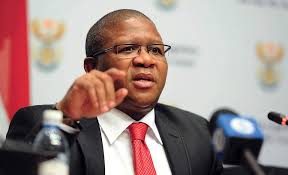By Andrew Warshaw
June 3 – South Africa’s government has issued a powerful denial of paying bribes to secure the 2010 World Cup, denouncing accusations that the infamous $10 million payment cited in the US indictment into widespread football corruption was linked in any way to buying votes.
In a packed Johannesburg news conference the day after FIFA president Sepp Blatter resigned in the wake of mounting corruption allegations, South Africa insisted the $10 million was “a totally above board payment” as part of its World Cup legacy and that the country would have won the right to stage the tournament whether or not the money had been sent to the Caribbean for football development.
“We won the bid clean,” insisted South Africa sports minister Fikile Mbulala (pictured) who said his country was the innocent party. “South Africa has not paid any bribe to anyone. We will never be part of vested interests. We want football to be clean. The FBI… can wake us up at anytime… we’re ready to explain.”
Justice authorities in the US claim the $10 million was a bribe that formed part of a massive $150 million corruption spree over two decades that transited US banks.
Several high-ranking FIFA officials have already been arrested as part of the US investigation, including disgraced former FIFA vice-president Jack Warner who has given himself up in his native Trinidad and is now out on bail pending extradition.
The South Africans argue that although the money was paid into an account handled by Warner, they did not think twice about transferring the payment since he was not being investigated by anyone at the time.
“There was no basis to doubt nominating him” since he was president of both CONCACAF and the Caribbean Football Union, reporters were told. It was “clearly articulated that the money would be used for football development. There was no reason for us to doubt Warner. He was a high-ranking FIFA official.”
The so-called bribe, it was further argued, was paid “years after the vote.”
Mbulala said his country didn’t have “sniffer dogs” who could check for “gangsters” and “crooks” in FIFA. Blatter, he said, had been a “good friend” of South Africa. “We will not lie about it. He delivered the World Cup to Africa. History will remember him.”
The $10 million payment to Warner’s soccer union for “diaspora” was the “idea” of the South African government, said director-general of sport Alec Moemi. But the payment was processed long after the vote and therefore couldn’t be construed as a bribe.
No-one from the organising committee or the South African FA attended the news conference and the one key flaw in the South African version of events is that no explanation was given of why the £10 million wasn’t disclosed publicly at the time it was paid in 2008.
There is an argument that World Cup hosts have a duty to disperse profits to benefit the game across the world. But at the very least the south Africans can be accused of a lack of oversight in terms of how the money was paid by arranging it through FIFA in that now infamous letter sent to FIFA general secretary Jerome Valcke.
But Mbalula insisted: “Payment made for approved projects can never be construed as bribery. Any insinuation to the contrary will be met with a rebuke. We will not allow ourselves to be collateral damage” for control of FIFA.
“We still need the United States authorities to share with us the basis of their allegations. The fact that a payment of $10 million was paid to an approved programme does not equate to bribery. Those who allege should prove their allegations. We refuse to be caught up in a battle between the United States authorities and FIFA.”
Contact the writer of this story at moc.l1751414656labto1751414656ofdlr1751414656owedi1751414656sni@w1751414656ahsra1751414656w.wer1751414656dna1751414656

